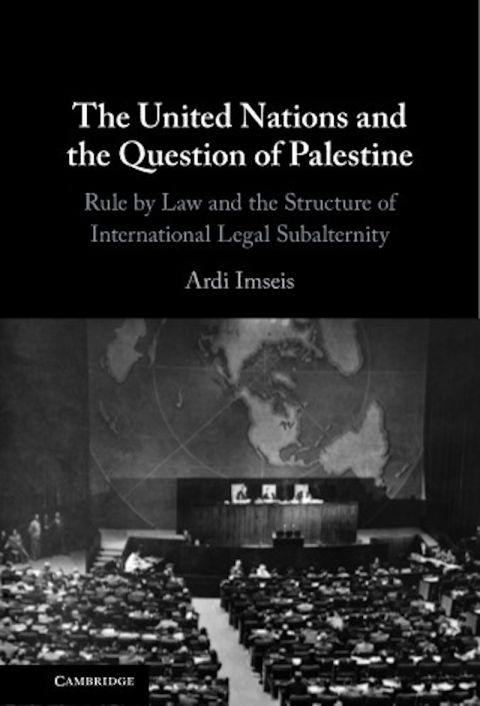

For the last six months, much of the world’s attention has focused on the latest conflict and unprecedented violence in Israel/Palestine. In the midst of the tumult, Professor Ardi Imseis has published a thought-provoking new book that critically considers the role the United Nations (UN) has – or, to be more precise, hasn’t – played in efforts to solve the enduring conundrum that is the question of Palestine.
In writing The United Nations and the Question of Palestine: Rule by Law and the Structure of International Legal Subalternity (Cambridge University Press), Imseis strives to make sense of a situation that, as he sees it, has only “gone from bad to worse.” In doing so, he explores the modern history of Palestine from a legal perspective.
But what Imseis has written isn’t just another academic treatise. Rather, as the distinguished South African international lawyer, and judge ad hoc of the ICJ, John Dugard writes in the book’s Foreword, Imseis presents “a distressing tale of international duplicity in the interpretation of the Charter of the United Nations in order to advance the interests and welfare of one people at the expense of another.”
Dugard goes on to observe that “The theme that runs like a thread through Imseis’s study is the notion of ‘legal subalternity’ according to which ‘the promise of justice through international law is repeatedly proffered under a cloak of political legitimacy furnished by the international community, but its realization is interminably withheld.”
The compelling rationale the author offers to support this contention is one he’s well positioned to make.
Prior to Imseis’s 2018 arrival at Queen’s Law, his CV included a 12-year career as a UN official in the Middle East, first with the UN Relief and Works Agency for Palestine Refugees in the Near East and then with the UN High Commissioner for Refugees. For the last six years, in addition to teaching and doing research that focuses on issues at the intersection of power, politics, law, and justice, and on the practical impact of those phenomena on international relations in general, and on underrepresented peoples in particular, Imseis also has continued with engagements at the UN.
From 2019 to 2021 he served as a Member of the Group of Eminent International and Regional Experts, a commission of inquiry mandated by the UN Human Rights Council to investigate and report on violations of human rights and humanitarian law in the conflict in Yemen.
Both Imseis’s UN experiences and his academic research have provided him with ample opportunities to study and consider the UN’s role in the question of Palestine. “The starting point for my book is the widely held representation that the UN is the standard-bearer of the rules-based international legal order. Based upon a close examination of the UN record, however, I’ve attempted to interrogate this received wisdom by demonstrating that there exists a vacillating gulf between what international law requires and what the UN has actually done,” Imseis says.
As he explains, the story that has unfolded since the late 1940s – and even in the decades before that – is impelled by actions as well as grievous omissions that have consigned the Palestinian people to a permanent state of deprivation and disenfranchisement in the international legal order.
Says Imseis, “The main claim of my book is that key legal texts and moments in the UN record demonstrate that Palestine and its people have historically suffered the effects of a long-range condition that I call ‘international legal subalternity.’
“The principal attribute of [this] is that those subjected to it are continually presented with the promise of a more just and equitable future though the application of international law bolstered by the unrivaled political legitimacy of the purveyor of that promise, namely the UN. Yet despite the lengths to which such groups go in reliance on this promise, its realization is perpetually kept out of reach in one form or another through the actions of the very same UN which all too often either does not pay sufficient heed to the full array of international law’s precepts or completely overlooks them in practice.”
Not surprisingly, in the face of recent events in Gaza any such argument is as topical as it is timely. That much has been confirmed for Imseis while outlining his views before audiences of academic colleagues and students in book-launch events at Osgoode Hall, U of T Law, McGill Law, and Queen’s Law. And Imseis has more book talks are planned in the United States, including at his alma mater Columbia Law School, New York University, Harvard, and Yale.
“For the most part, the feedback I’ve received so far has been favourable,” Imseis says. “And I’m looking forward to sharing my research further and to hearing what more people have to say as they read it and consider my argument. Although the book long-predates current events in Gaza, the unspeakable and unprecedented tragedy of what we are now witnessing there gives my book added urgency.”
For more information about Professor Ardi Imseis’s book and to read an excerpt, please visit the publisher's website.
By Ken Cuthbertson, Law’83